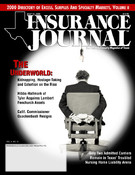2001 Legislative session to bring changes to agent licencing
In an effort to comply with the uniformity and reciprocity requirements of financial services reform, the Texas Department of Insurance will likely soon change laws governing surplus lines agent residency requirements.
Commissioner Jose Montemayor said that, while a final product has not been created, he sees the department changing its law to eliminate the residency requirement as prescribed by the National Association of Registered Agents and Brokers provision.
“In order to achieve uniformity and full reciprocity at the national level—and forestall NARAB—we are going to have to remove all residency requirements for all agents licenses. Therefore, the resident requirement for surplus lines agents will have to go,” Montemayor said.
“As the surplus lines market evolved in a post Gramm-Leach-Bliley Act environment, our rules will have to continue to evolve to follow market practices as they develop.”
According to Phil Ballinger, general manager of the Surplus Lines Stamping Office of Texas, under the current formula, the agent of record has historically been interpreted as the highest in the chain before it leaves the state.
For example, if an agent in Houston writes through an MGA in Dallas that writes through a general agent in Atlanta, the MGA is most often the surplus lines agent with the general agent acting more as an underwriting manager.
But under the new system, the Atlanta general agent could just as easily be registered as a non-resident surplus lines agent.
The idea of eliminating residency requirements does not set well with everyone Ballinger said.
There are two schools of thought, he explained.
One school believes eliminating residency requirements will open Texas to too much competition, thereby undermining the market.
“There’s another school that believes the really big guys that wanted to be in Texas are already here,” he said. “So the non-residency restrictions being removed isn’t going to create that big an inflow of business. I agree with that.”
Regardless of who is ultimately right, the legal requirements of surplus lines agents won’t likely change with residency requirements.
“If surplus lines agents do not meet their responsibilities in performing a diligent effort in the placement of the surplus or excess risk-or fail to do an appropriate amount of due diligence regarding insurer solvency and financial strength—they face regulatory and civil consequences,” said Commissioner Montemayor.
“The regulatory consequences ultimately could lead to a loss of license, restitution payments and payment of a monetary fine. On the civil side, they are vulnerable to suits in a court of law for the recovery of damages caused by their non-performance. I do not see any changes [in legal obligations] occurring because of a change in the law eliminating the residency requirement.”
Those legal obligations are outlined in Article 1-14.2 Section 8(a) of the Texas Insurance Code.
As stipulated by the code, surplus lines agents must: personally make a reasonable inquiry into the financial condition and operating history of an unauthorized insurer; be under a continuous duty to stay apprised of each insurer’s solvency and financial strength; is under a further duty to inform the Commissioner and SLSOT of any reasonable doubt as to the capacity, competency, stability, claims practices or good faith of a surplus lines insurer; and has the duty to place surplus lines insurance on Texas risks only with an eligible insurer that possesses financial solvency adequate to its business, has a reasonable surplus to policyholders, is of good repute and competently managed, provides reasonably prompt claims service and meets all other criteria under the TIC Art. 1.14-2.
In order to help surplus lines agents meet these demanding responsibilities the SLSOT web site (www.slsot.org) includes the list of eligible insurers, SLSOT bulletins and various information from TDI, such as the annual insurer evidence filing requirements letter.
Also, a five-year financial summary page for each currently eligible surplus lines insurer is provided, highlighting key financial results, ratios and graphs of certain financial trends. The summary pages are updates each Friday for insurers evaluated that week.
SLSOT also maintains an evidence file containing the required eligibility evidence on each insurer, including annual statements, annual reports, exam reports, biographical affidavits and licenses or certificates of authority. These documents are available for inspection at the SLSOT offices.
Finally, the financial analysis of SLSOT’s web site evaluates each insurer annually. The evaluation process comprises many financial tests, ratio analysis and other objective measures. Part of the evaluation relies on familiarity with current information about each insurer and its company group.
Topics Texas Carriers Agencies Excess Surplus
Was this article valuable?
Here are more articles you may enjoy.


 Insurance Broker Stocks Sink as AI App Sparks Disruption Fears
Insurance Broker Stocks Sink as AI App Sparks Disruption Fears  Fla. Commissioner Offers Major Changes to Citizens’ Commercial Clearinghouse Plan
Fla. Commissioner Offers Major Changes to Citizens’ Commercial Clearinghouse Plan  Munich Re Unit to Cut 1,000 Positions as AI Takes Over Jobs
Munich Re Unit to Cut 1,000 Positions as AI Takes Over Jobs  Jury Finds Johnson & Johnson Liable for Cancer in Latest Talc Trial
Jury Finds Johnson & Johnson Liable for Cancer in Latest Talc Trial 


